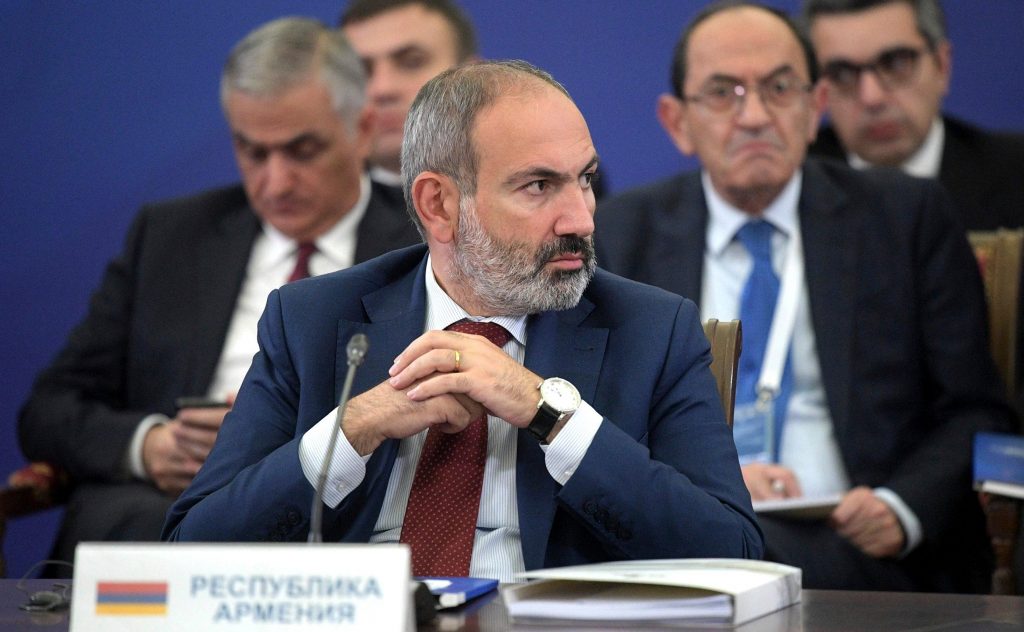Armenian Prime Minister Nikol Pashinyan said he hoped his drive to establish full diplomatic relations with historical adversary Turkey, and open the joint border, could be completed this year.
Pashinyan was addressing a news conference a day after Armenia’s President, Armen Sargsyan, announced his resignation.
One political analyst said the president’s departure was probably linked to Pashinyan’s bid to overturn Armenia’s post-Soviet foreign profile by pursuing relations with Turkey and signing a durable peace treaty with Azerbaijan.
Pashinyan and Azerbaijani President Ilham Aliyev have held two remarkably successful meetings since November aimed at kick-starting the peace process a little over a year after the “Second Karabakh War” in which Azerbaijan “deoccupied” large stretches of territory held by Armenia for three decades.
“We are sincere in wanting to normalise our relations with Turkey without pre-conditions and we want to open the border. In the past, we weren’t able to do this, but we must make good use of that experience,” Pashinyan told reporters by video link.
“Will it be possible to set up diplomatic relations this year? I don’t know. Not everything is up to us. But I think it would be logical to achieve this result – establishing relations and opening the border.”
He said Armenia would probably accept Turkey’s invitation to attend the Antalya Diplomacy Forum in March.
Pashinyan’s made his remarks a little more than a week after Armenian and Turkish negotiators held the first set of talks in Moscow in what both sides described as “a positive and constructive atmosphere”. The two sides nominated representatives on setting up formal relations and Turkey’s civil aviation authority said two airlines would begin flights between Yerevan and Istanbul next month.
Abortive 2009 attempt to build ties
In 2009, Turkey and Armenia signed an agreement to normalise relations intended to lead to the opening of their shared border. Armenia, however, failed to ratify the document and abandoned the procedure in 2018.
Armenia and Turkey have had traditionally tense relations dating back to the massacre of ethnic Armenians by Ottoman Turks in World War One and the Turkish-Armenian war in 1920.
Pashinyan has been widely blamed both for last year’s devastating losses in the conflict with Azerbaijan as well as for his rapprochement with Turkey – an unthinkable prospect for nationalist politicians. But mass demonstrations calling for his resignation had little effect – he easily won a snap election last June.
Pashinyan’s talks with Aliyev have been punctuated by periodic outbreaks of violence along the border separating the two neighbours. But the discussions have tackled previously intractable issues – including the creation of corridors crossing each other’s territory and demarcating borders inherited from Soviet times.
The Armenian prime minister last week set up a working group on restoring the Soviet-era rail line from Azerbaijan to its exclave of Nakhchivan through Armenia’s Meghri district – a reversal of longstanding objections to the project. A road link along that route, referred to in Azerbaijan as the “Zangezur corridor”, is also expected to be set up.
Building the rail link to Nakhchivan
In his latest comments, Pashinyan put the cost of upgrading the trade link through Armenian territory at $226 million and said foreign companies had expressed “huge interest” in the project.
Azerbaijan’s AzerTAdzh news agency reported that new bus routes were now operating between Baku and Shusha, a city just inside Nagorno-Karabakh and long considered the country’s cultural capital, and to Agdam, just outside the territory.
Karabakh, internationally recognised as Azerbaijani territory for decades and home to a large ethnic Armenian community, was the focal point of both conflicts.
Armenian forces took over Karabakh as the Soviet Union was collapsing and held it for 30 years, expelling large numbers of Azerbaijani residents. Azerbaijan now has full control over the region and some 50,000 people have returned to their homes.
Armenian President Armen Sargsyan was viewed as one of the last members of Armenia’s “old guard” of politicians and his sudden resignation was linked by many to recurrent disagreements with Pashinyan after last year’s 44-day conflict ended by a Russian-brokered truce. He said he stepped down because the constitution, which provides a largely ceremonial role for the president, did not give him any authority to influence policy.
But analyst Grant Melik Shakhnazaryan said the resignation exposed a major rift over the country’s future diplomatic orientation under Pashinyan.
“In all likelihood, Armen Sargsyan’s decision is linked to forthcoming changes in relations with Azerbaijan and Turkey,” Shakhnazaryan told Russia’s Tass news agency.”Many link the sudden resignation to his unwillingness to assume responsibility for government decisions which are unpopular and viewed with suspicion among the population.”
Analysts say his departure will not affect Armenia’s diplomatic initiatives as they have been spearheaded by the prime minister.
Sargsyan was largely left out of the negotiations to end last year’s hostilities. And he objected to Pashinyan’s dismissal of military leaders as the mass demonstrations proceeded.

